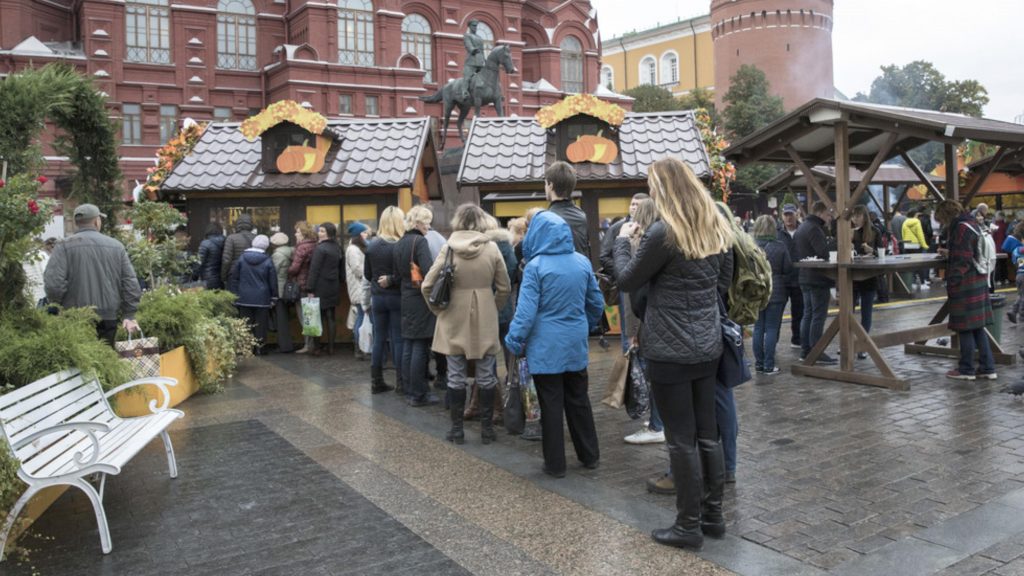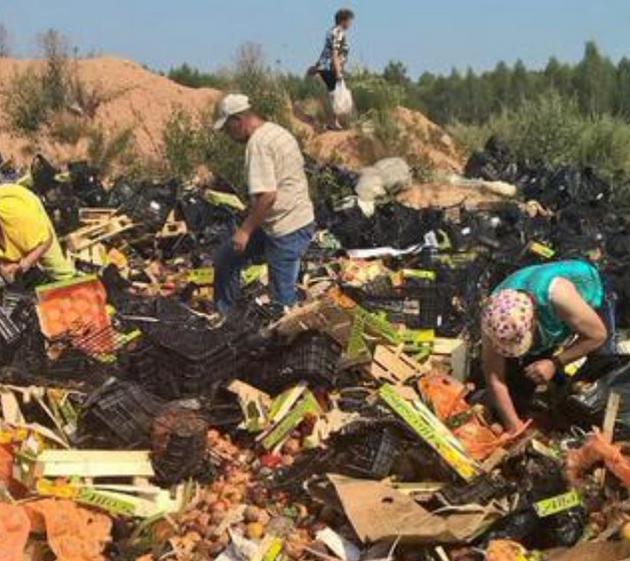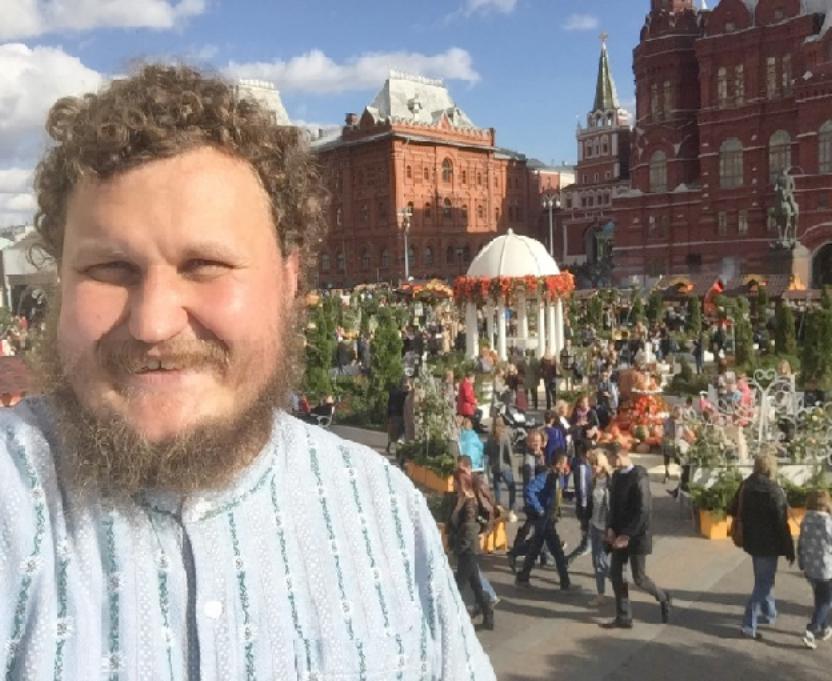On September 30 / October 1, the Cheese Days Festival took place in Moscow. Most of the stalls were located in the square right in front of Kremlin. They were overflowing with at least 100 types of Russian-made cheese, including brie, camembert, gorgonzola, mozzarella, burrata and others.
Sixty Russian manufactures were represented from twenty regions, including the Yaroslavl, Lipetsk, Vladimir and Moscow.
Cheese makers said they had set a “cheese record”. Sales exceeded even the most optimistic forecasts: festival goers bought 62 tons of cheese products, which was 20% more than sellers had available, so they urgently had to bring in another 10 tons of cheeses.
By the end of the first day it became clear that the demand significantly exceeds supply. Queues for the cheese in the center of Moscow resembled those that took place in the harshest Soviet times of shortages.
In the evening, after the end of the first day of the fair, all sellers rushed to their homes and removed from their warehouses all the cheese, but these reserves were obviously not enough. People were willing to stand in line even to taste a tiny piece of cheese.
Why were the Muscovites so eager to get the cheeses?
Two years ago Putin’s government banned a wide range of meat, fruit and milk products from the United States and European countries in retaliation for Western sanctions on Russia over its annexation of Crimea and incursion into East Ukraine.
Putin signed a decree, ordering the destruction of any banned products that were continuing to seep across the border and onto store shelves.
In 2015 the destruction of more than 350 tons of food in one week, cheerfully presented by Russian media, angered Russians. Many are struggling to feed themselves and recall food shortages just a generation ago.
The food was burned and flattened by bulldozers.
“You can’t just destroy food when there are so many people who have trouble feeding themselves,” said an activist Olga Saveleva, whose petition on Change.org had gathered over 320,000 signatures.
“The media is gleefully showing how this food is being burned. We have a lot of people going hungry, a lot of people in poverty. There are veterans of World War II who remember the blockade of Leningrad, when hundreds of thousands of people died of hunger. This is a mockery.”
The petition didn’t stop the destruction of food by Russian government. It is still going on. The main government’s message is: Russia will never give in to sanction pressure.
The government is trying to present the destruction of foreign produced food as a positive measure, triggering growth of the national Russian agriculture and food production.
On August 4, 2015, Prime Minister Dmitry Medvedev told the government: (https://www.rt.com/politics/311550-pm-medvedev-to-personally-head/)
“Import replacement is currently one of the key directions of the government’s work. This is why we must create a separate government commission for import replacement. I will personally head the commission.”
Medvedev specified that the main task of the commission was “to create conditions for domestic production of goods that we have earlier received as imports.”
At the same time, Medvedev told that the country was interested not in simple replacement of imports, but in creation of an economy that would produce competitive goods for international markets.
Moscow Cheese Days Festival was expected to demonstrate the results of two years of import replacement activity in Russia.
The main hero of the festival was 28 years old Oleg Sirota, who two years ago sold his IT business and cars, borrowed money from family members, and cut a deal with the Moscow regional government to rent land at a discounted price. Putin’s plans for import replacement inspired Sirota to create a cheese producing company of his own: the Russian Parmesan.
American media is not used to paying a lot of attention to cheese production in Russia. Oleg Sirota seems to be the only Russian cheesemaker to whom a large article in The Washington Post was devoted.
The article is entitled: “Please pass the Russian Parmesan: Cheesemakers celebrate sanctions, and hope they continue.”
Sirota is quoted by The Washigton Post as saying: “We should overcome… When you pressure Russians, even with something like cheese, we only become stronger.”
The article is very interesting and informative, still it left me with the feeling that Russia is succeeding with import replacing, while many Russian publications were asserting the opposite.
It was difficult not to notice that all of the Russian cheese producers couldn’t produce enough cheese to satisfy just two days demands of the consumers in the center of Moscow.
Before sanctions Russia imported about 300,000 tons of cheese a year. To replace this amount of import, it is necessary to construct about 10 thousand such dairies like Oleg Sirota’s. And also the same number of new farms to produce enough milk will be needed.
Sirota is an active Russian Orthodox believer and an avid supporter of Putin’s politics. When he opened the Russian Parmesan for business, he put the flag of Novorossiya, the separatist regions of southeast Ukraine, over the entrance to his Moscow office. Sirota has sent the first wheel of cheese he made to Putin. Sirota has all the state support that one can have. Nevertheless he has encountered and still encounters many difficulties.
Though Sirota’s company is named Russian Parmesan, it still does not produce parmesan. It turned out that the milk produced by Russian farms is not good enough for making hard cheeses. Sirota tried to inspire farmers to improve the quality of their milk, but he hasn’t succeeded. There are not enough farmers to satisfy demand for even low quality milk in Russia. Farmers don’t want to raise cost of their production. Now Sirota is building a farm of his own, buying 33 cows.
The main problem of Sirota is impossibility to find professional workers for his company. After the disintegration of USSR, the flood of cheap products from abroad stopped Russia from producing it’s own goods. So they ceased educating professionals for agriculture and many other types of industry.
Now import replacement is possible only by producing goods much more expensive than imported ones.
The only thing that is encouraging Russian enthusiasts of import replacement is the existence of the sanctions. Without them imports will flow again to the shelves of Russian stores.
The real, native Italian parmesan was sold in Russia for 12 Euros per kilo. Of course, no Sirota would be able to compete with this low price for many, many years to come.





This is why Russia is so desperate to get Donald Trump elected. The sanctions are killing Russia, and they know with Trump in office he will lift the sanctions, and do everything for Putin. After all, he owes them billions of dollars.
Trump is a Putin asskisser, and an American traitor. Russians are tired of eating cheese. Russia is finding out that karma is a bitch. They invade countries, and kill babies and innocents with impunity, and Donald Trump would have us embrace these monsters.